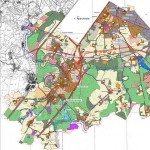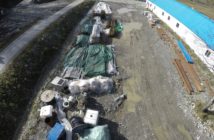 Today MANS submitted to all party caucuses in Montenegro’s Parliament a suggested “Decision on Amending the Spatial Plan of Montenegro till 2020,” alongside a request that it be taken up in the assembly.
Today MANS submitted to all party caucuses in Montenegro’s Parliament a suggested “Decision on Amending the Spatial Plan of Montenegro till 2020,” alongside a request that it be taken up in the assembly.
MANS’ initiative seeks to protect the public interest, which was seriously neglected during the privatization of the Ulcinj Saltworks, when some 15-million m2 of land was sold at a very low price. At the time this area was classified as ‘industrial’ and not as potential ‘construction development’ property, which is the classification under which Eurofond and Veselin Barović are trying to sell it under now.
The conditions for this type of situation, which directly impacts the public interest in a negative way, was created during the the preparation of the Spatial Plan for Montenegro several years ago. At that stage, the land of the Saltworks was removed from the list of potential “monuments to nature” and was instead classified as a potential tourist accommodation development zone.
The exploitation of sea salts is still recognized in the Plan as one of the potential developmental resources of the Ulcinj region. MANS will therefore attempt to harmonize the Spatial Plan with its proposed initiative, since this is the peak legal document for zoning regulations and provides the vital framework for lower-order planning documents.
In the proposed legislation submitted to MPs today, it is noted that the area of the Ulcinj Saltworks is recognized as both a developmental potential for the exploitation of sea salts and as a site for the building of tourism capacities. This duality in the existing planning documentation leaves an enormous space for creative interpretation of the area’s eventual use during the preparation of lower-order planning documents. In fact, the Spatial-Urban Plan of Ulcinj is currently being prepared by municipal authorities, giving added impetus to resolving this ambiguity immediately.
Considering the importance of the Ulcinj Saltworks for the economic development of the local community, but also for the entire Ulcinj region – not to mention the importance of these salt-flats for local flora and fauna – we believe that it is important to harmonize the text of the Spatial Plan of Montenegro to ensure that the existing uses of this space are retained (in accordance with the principles of sustainable development).
The problem of planning in Montenegro was again illustrated by the announced sale of the entirety of the Ulcinj Saltworks’ property and real-estate at a price many times higher than that at which it was initially purchased. Such a scenario means that the lands of the Saltworks will be sold for tourism development, raising the specter that the existing salt-production facilities will be extinguished. The company has been bankrupt now for several years due to the mismanagement of Veselin Barović’s Eurofond and the “loss” of the concession for exploiting salt in the region under suspicious circumstances.
Bankruptcy, the dismissal of workers, the accumulation of debts, lack of investment in the production process, etc. are only some of the features that have characterized the “Montenegrin way” of privatization. Many privatizations aimed at seizing valuable lands for future development and property speculation, instead of reviving the enterprises purchased. In an unacceptably high number of cases, the state was an active accomplice in these scenarios, adopting laws and urban plans that allowed the new owners to complete their transactions.
Unfortunately, the Spatial Plan of Montenegro from 2008 has only further facilitated such forms of property speculation. At the time of the law’s passing, MANS warned those responsible at the relevant Ministry – including then serving Minister Branimir Gvozdenović – of the scenario that we now see playing itself out. Unfortunately, the Ministry failed to head our warnings. It seems that someone, other than Barović, was also interested in seeing the Ulcinj Saltworks go under so that the salt-flats could eventually be cemented as a base for the development of tourism capacities.
If the state allows Eurofond, which initially purchased the property as ‘industrial’ land at a low price, to now resell it as ‘construction’ land at a much higher price – Barović will become one of the biggest winners of Montenegro’s transition. There are very few examples, outside of Russia’s infamous privatization process, that can be compared to what is unfolding currently in Ulcinj.
MANS again calls on MPs to consider our draft legislation and to decisively take a stand in defense of the public interest.



